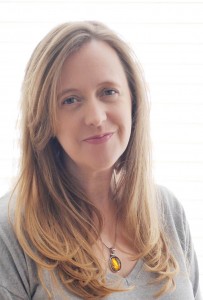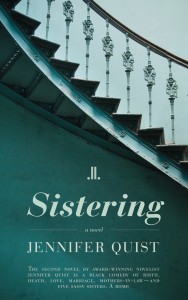In the Spotlight
MEET Jennifer Quist: A T8N interview
December, 2015

| Ever wonder what life would be like if the prediction from your senior yearbook came true? Jennifer Quist doesn’t have to. No, she didn’t discover who stole the cookie from the cookie jar. Unlike many of us (who now cringe at that joke), Quist was actually funny in high school. And her ambition “to have students be forced to read my stuff” came true when one of her essays was published in a college textbook. Flash forward to today, and she’s the recipient of a Lieutenant Governor of Alberta Emerging Artist Award and the author of two highly acclaimed novels. Writer, talker, boy-raiser—this is the story of Jennifer Quist. |
t8n: Are you from a family of storytellers, readers, etc.? Where does your passion for narrative come from?
JQ: I’m from a Maritime family with a penchant for dark comedy and ghost stories. Now that you mention it, our traditional stories have been mostly oral. When I was 13, my dad told me to write down one of my grandmother’s stories. I did and became something like a keeper of the family lore— a bad one who contaminates it with her own fiction.
t8n: What’s your connection to St. Albert?
JQ: My parents moved here the year I got married and left home for good. We were students at the U of A who couldn’t afford coin-operated laundry, so we spent a lot of time in the city, mooching. When the time came to return to the Edmonton area, we landed right back here.
t8n: What themes are you attracted to in your work?
JQ: The only themes there are: love and death—the ways people overcome the immediate and imminent distances between each other.
t8n: Tell us a little bit about what the process of being edited is like for you?
JQ: My style is terse, my novels are relatively short and editing for me is usually a process of adding material rather than paring it away. After writing in isolation for most of my career, it’s a great relief to have editors to work with. I’ve done most of my writing on my own, in smaller cities, cramming it around my responsibilities to my five sons—a schedule that doesn’t lend itself to travelling to gatherings, hashing out stories with mentors and peers. Editing is a gift of someone else’s time and close attention and inspiration, and I’m grateful for it.

t8n: Some writers are squeamish about sharing their work. How comfortable are you?
JQ: I don’t like stuff that isn’t well-formed being handed around, but once something’s finished I love for people to read it. I’m always nervous, but I don’t think that’s the same thing as squeamishness. For me, writing is an act of empathy and sharing. Readers may be the biggest reason I write.
t8n: Your latest novel, Sistering, is set in Edmonton. Tell us about that decision.
JQ: Especially outside our region, Alberta novels are often typecast as rural. It’s neither a fair nor accurate categorization. Alberta novels are not always set on farms and ranches. It’s hard to tell from Can-Lit clichés but, as we know, most Albertans are urban. So chalk my novel up as yet another example of how there’s more to Alberta stories than bad weather and manure.
t8n: If Sistering were ever to become a film, who would your dream cast include?
JQ: Ya stumped me there. I don’t know much about actors. My son says the sisters’ mother should be Carrie Fisher. Sure, kid.
t8n: You won an Alberta Lieutenant Governor’s Emerging Artist Award in 2014. How important are awards for emerging artists?
JQ: The recognition that comes with an award can be very helpful. The market turns out more excellent books than anyone can read, every single season. It’s difficult for good work to stand out because so much of what’s available is so good.
t8n: What role, if any, has social media played in your career?
JQ: Facebook is a way to update people I already know, but Twitter is a great way to talk to strangers. When my first novel was published, I lived in Lacombe, a tiny city south of Edmonton. Twitter was useful for introducing me to the Edmonton and Canadian writing community. It’s also helped me reach the US and abroad.
t8n: One of your high school yearbooks lists your future ambition as “to have students be forced to read my stuff.” What did your backup plan look like?
JQ: I’m good at schoolwork, and my original career plan was to stay in school forever and become an academic. Then, instead of going to grad school, I decided to start my family in my early twenties. That professional “detour” to have kids was actually what made it possible to fulfill my real, unspeakable goal of working as a writer. When I left school right after my degree, it looked like I was making a sacrifice to have my family. It doesn’t make sense, but I sacrificed nothing in terms of my career when I had the boys. Instead, I gained what I truly wanted all along.
t8n: If you could have been the original author of any book/poem, what would it have been and why?
JQ: Haha! It’s like asking me whose husband I wish I’d slept with.
t8n: Best first line of a book you’ve ever read?
JQ: How about my least favourite? “All happy families are alike; each unhappy family is unhappy in its own way.” I adore Tolstoy and Anna Karenina, but this sentiment is just wrong. Families are fingerprints. I’ve never seen a family that isn’t fascinating and completely original, no matter how they get along.
t8n: What’s on your reading stack right now?
JQ: Mostly books by people I know: Albert Braz, Apostate Englishman, Padma Viswanathan, The Ever After of Ashwin Rao, Caterina Edwards, The Sicilian Wife and a whole lot of Chinese character flashcards.
t8n: What are you currently working on?
JQ: I’m back at the university, working on learning Chinese and edging toward the grad school plan I passed on in my twenties, now that all my kids are in school. As far as writing goes, I do have a third novel in its very early stages—something about a grown brother and sister and an Alberta abattoir.
t8n: Any upcoming events our readers can find you at?
JQ: My Edmonton launch of Sistering is in the history books, and I’ve got nothing further planned in the local area right now. But winter is the high season for book clubs, and I am open to invitations. Send me a message, and I will appear.












